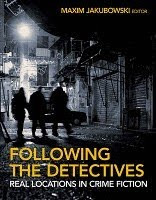 Arnaldur Indriðason
Arnaldur Indriðason's cheerful demeanor belies his country's
financial meltdown. That crisis also came up during my discussion with Arnaldur's fellow Icelandic crime writer
Yrsa Sigurðardóttir. I asked her if it could become Iceland's JFK moment, a counterpart to the murders of
Veronica Guerin in Ireland and
Olof Palme in Sweden and a comparable spur to crime fiction. Could economic unrest spark social unrest if vanishing credit makes basic commodities hard to come by, for example?
Her verdict? Too early to tell, though she and her companion said a banker friend of theirs had been harassed in the streets. And, they added, Icelanders lack a tradition of social protest: "We don't demonstrate well."
(Arnaldur Indriðason and your humble blog keeper. Photo courtesy of Ali Karim)==========================
 Jason Goodwin
Jason Goodwin's Edgar-winning novel
The Janissary Tree contains tasty, unobtrusive and believable scenes of his protagonist, Yashim, preparing meals. No surprise, then, that Goodwin's Web site discusses the
Ottoman culinary tradition, complete with recipes, to which Yashim would have been heir in nineteenth-century Istanbul. No surprise either that Goodwin says the book is "all about cookery," including – well, let's just say for purposes other than preparation of meals.
(YHBK and Jason Goodwin. Photo courtesy of Ali Karim)==========================
A seafood restaurant near the convention hotels – call it Fishnet – and a brew pub next door were evening resorts of choice for a floating group that included a number of folks you've read about in my
Bouchercon reports and elsewhere on this blog (me, Declan Burke, John McFetridge, Donna Moore, Christa Faust, Angie Johnson-Schmit, Stacia Decker, Scott Phillips, Duane Swierczynski, et al.) and some you haven't. (Hi, Anita.) Prominent among the group was Philly Poe guy
Ed Pettit, who has made it his mission to get Edgar Allan Poe back to Philadelphia.
I can't reveal what plans were hatched at the pub and restaurant – call it the Bucket o' Bait – but had I been able to score a doggie bag big enough, Poe's body would be back in Philly now.
Hasta
Indianapolis!
© Peter Rozovsky 2008Labels: Arnaldur Indridason, Arnaldur Indriðason, Bouchercon, Bouchercon 2008, conventions, Ed Pettit, Jason Goodwin, Yrsa Sigurðardóttir























